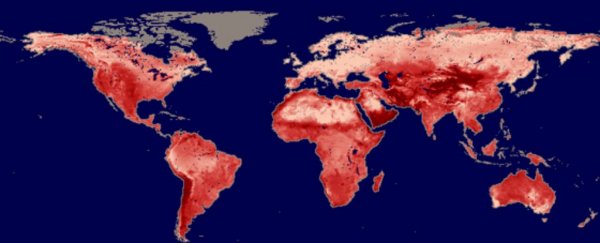The Paris climate accord's goal is to keep global temperatures "well under" 2 degrees Celsius, and 1.5 degrees Celsius if possible.
Now, a new study reveals that if we can achieve that lower target, it could save the world tens of trillions of dollars over the next 80 years.
These savings take into account things like the price of storms becoming more intense and more frequent, the price of agricultural yields beginning to slip and the price of negative public health consequences.
"Achieving the more ambitious Paris goals is highly likely to benefit most countries -and the global economy overall - by avoiding more severe economic damage," said the study's senior author Noah Diffenbaugh, a professor at Stanford University.
In fact, over the course of the century, a world where temperatures are kept to 1.5 degrees would generate $20 trillion more in GDP than a world where temperatures are kept to 2 degrees.
Even better, the economic benefits from fighting climate change will be felt the world over. The study has found that four-fifths of all countries and 90 percent of the global population will benefit from avoiding the costs of higher temperatures.
However, there are some economies that could suffer. These include the economies of Russia, Canada, the Nordic and Baltic nations, and central Europe.
The researchers were able to calculate this by studying how economic performances have been linked to global temperatures historically.
They then used climate models to predict how economic output would likely change in the future if the global temperature was 1.5 degrees warmer, 2 degrees warmer or 3 degrees warmer.
On our current trajectory, the world is headed towards the 3 degree mark by 2100. If nothing is done to stop this scenario, the study found it will likely lower economic output by up to 25 percent come the end of the century.
But as groundbreaking as this study is, there are limitations.
"GDP is a useful metric to assess the benefits of limiting global warming," said Wolfram Schlenker, a professor at the Columbia University's Earth Institute, who was not involved in the study.
Still, predicted impacts of global warming would be even greater, he said, "if the non-market benefits of reduced fossil-fuel use - for human health and ecosystems, for example - were considered."
In other words, this study is a conservative estimate because it does not comprehensively consider the money that would be saved from improved global health and healthy ecosystems.
The study's estimates are made even more conservative by the fact that it does not take into account the acceleration of melting ice sheets or sea level rise in the coming years.
Furthermore, the study may also underestimate the costs associated with shifting to a low-carbon global economy that would be needed to actually achieve the 1.5 degree target.
After all, scientists are skeptical that we can even achieve the 2 degree target let alone the 1.5 degree target. To achieve 1.5 degrees, we might have to pull excess CO2 out of the air – a technology that has still not yet been developed.
"The results should be interpreted with caution," said Bob Ward, policy director at the Grantham Research Institute on Climate Change and the Environment in London.
"They have not taken into account the additional costs of reducing emissions to meet the stronger [1.5 degree] target, which could be substantial, particularly if negative emissions technologies are needed."
The study has been published in Nature.
Science AF is ScienceAlert's new editorial section where we explore society's most complex problems using science, sanity and humor.
